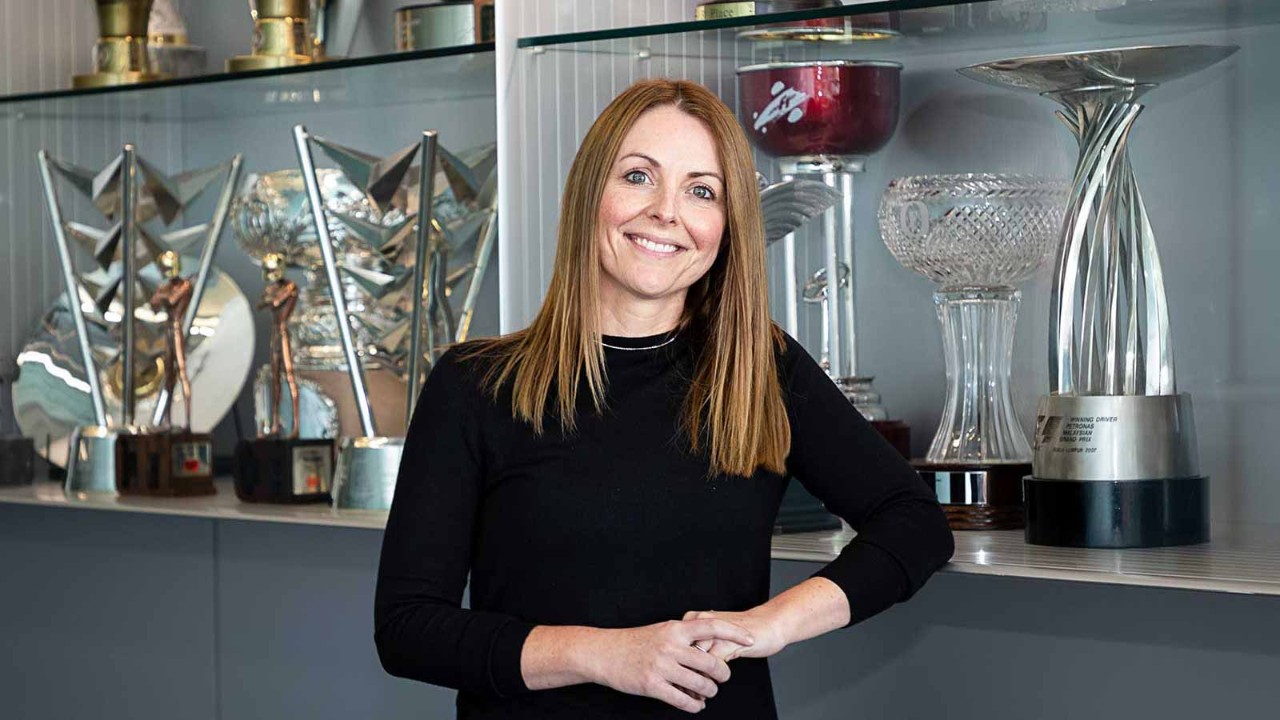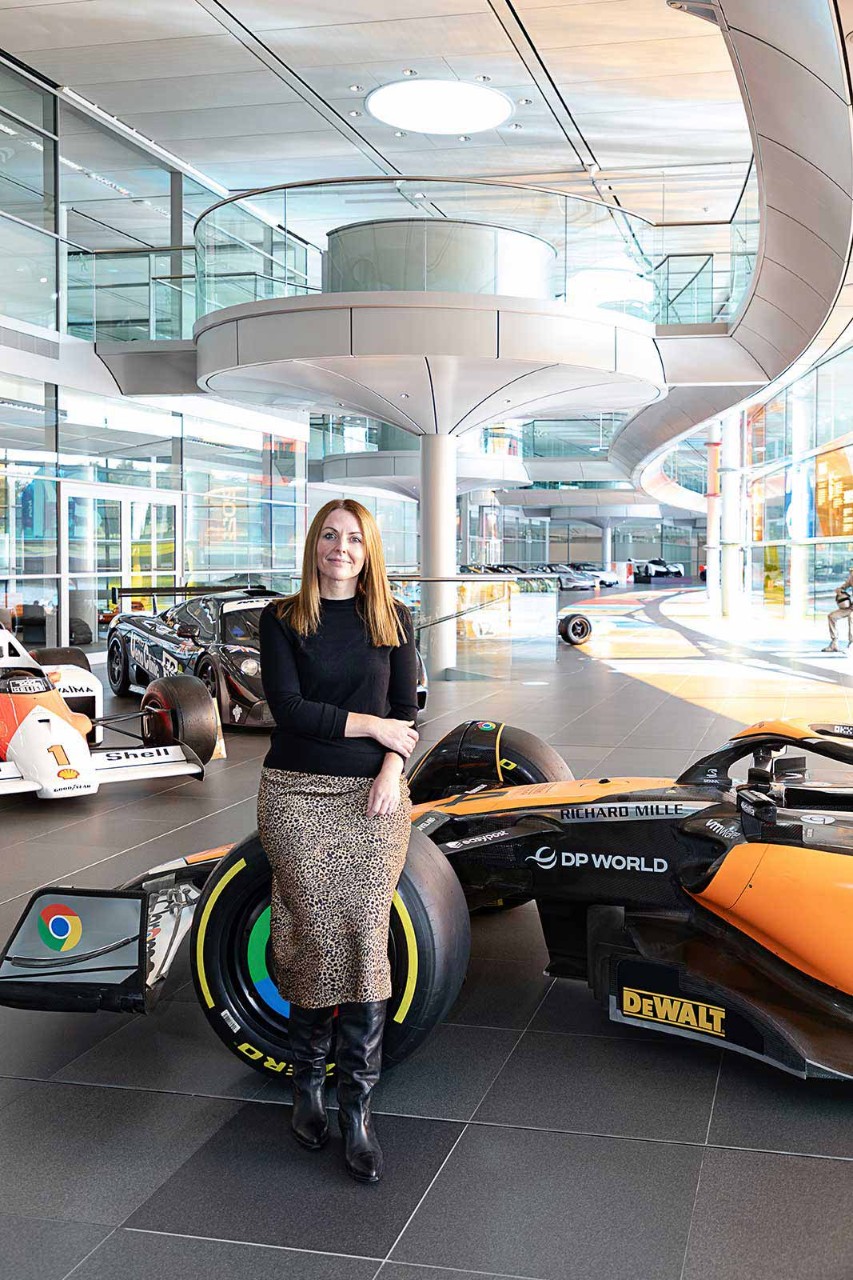
Walking into the McLaren Technology Centre, home of the famous Formula 1 racing team, is like walking into a different world. F1 cars once raced by legends such as Ayrton Senna and Niki Lauda sit alongside some of the fastest road-legal hypercars in the world. It feels like a cross between a Bond villain’s lair (which it isn’t) and an incredibly upmarket car showroom (which, at least in part, it is).
It was into this world that Laura Bowden FCCA first walked in 2008 when she joined the McLaren Group as a management accountant. It was an exciting time for the F1 team – a 23-year-old driver, Lewis Hamilton, won his first world championship with McLaren that year. That, though, was the last time the team won the F1 world drivers’ championship, as the Red Bull and Mercedes teams have dominated ever since.
‘It is a lot of hard work that is finally materialising in podiums’
Founded by the racing driver Bruce McLaren in 1963, the team has never given up on getting back onto the top step of the podium, and there has been a resurgence recently, with McLaren drivers securing their first double-podium placing in two years in the September 2023 Japanese Grand Prix.
Teamwork
It is this teamwork that stands out for Bowden, who has been McLaren Racing’s CFO since February 2020. ‘Seeing the team pull together has been very motivating and inspiring,’ she says. ‘It is a lot of hard work that is finally materialising in podiums, and it is great to be part of it.’
Inevitably much of the public attention is focused on the drivers, but there is also general recognition that F1 is a team sport: literally every cog must work in unison to achieve the results on the track. It is something that applies as much to finance as to the precision engineering that takes place behind the smoked glass of McLaren’s Surrey-based headquarters.
‘We are in the third year of the cap and seeing more battles on the track’

‘My role covers not only finance – I look after procurement, IT, facilities and the programme management office, and, more recently, legal has come under my remit as well,’ Bowden explains. There are 35 members of the immediate finance team while the extended team under Laura has close to 100 members.
CV
2020
CFO at McLaren Racing, having previously served (from 2008 on) as management accountant at McLaren Group, financial controller at Absolute Taste (formerly owned by McLaren Group), financial planning and analysis manager at McLaren Racing, head of finance at McLaren Technology Group, FD at McLaren Marketing, and FD at McLaren Racing
1998
Accountant at Surrey-based practice Porter Garland
Cost cap
One major challenge in F1 finance is that all the teams face a cost cap on the amount they can spend in a single season. The cap – which is designed to level the racing track for all F1 teams and encourage competition – now sits at around US$150m (£123m). There must have been a collective sigh of relief when all 10 F1 teams were recently given a clean bill of financial health.
‘The financial regulations are as important as the sporting and technical regulations – the whole team and the whole sport recognises that,’ Bowden says. ‘The cap was really important because ultimately F1 and the FIA [Fédération Internationale de l’Automobile], the governing body, needed to find a way to ensure the sport was sustainable going forward and to start to even out the playing field on the track.
‘Now we are in the third year of the cap and seeing this come to fruition. We are definitely seeing more battles on the track.’
Sustainability scrutiny
The spending cap is just one initiative to secure the sustainability of F1. McLaren’s sustainability report, released in May 2023, highlights a number of key Global Reporting Initiative-based metrics on the team’s economic, environmental and social impact.
Bowden sits on the team’s executive steering committee, which drives McLaren’s sustainability agenda. Over the past 12 months it has been lobbying for greater collaboration across the industry to help create a regulatory framework that will allow the teams to invest in innovation without compromising performance on the track.
McLaren CEO Zak Brown, Bowden’s boss, wants to see a number of changes, including the consideration of sustainability-based initiatives within the cost cap so the team can invest more in this space. Such moves could come through during negotiations over a new set of regulations due to come into force in 2026.
‘We will see McLaren drivers on the top step of the podium at some point’
A move to greater diversity within the industry is an important part of the wider sustainability drive. Bowden herself remarks on how much has changed since she joined the team 15 years ago.
‘It’s a very different environment. The culture has changed hugely. One of the things I was really conscious of when I joined was just how few women there were in the organisation. It has moved significantly from where it was. Every department you venture into, you see the shift.’
McLaren is also involved in diversity, equity and inclusion initiatives such as McLaren Racing Engage, 60 Scholars and the F1 Academy. And In 2022 alone, 33% of new starters at McLaren Racing came from under-represented backgrounds.
McLaren Racing itself, which is a 70/30 joint venture between McLaren Group and two independent US-based shareholders, has diversified in terms of the competitions it races in. It now takes part in the US IndyCar series, Formula E, the off-road Extreme E series, and even an e-sports series. By the end of the current 2023 season, the team will have taken part in 62 races. ‘The volume of activity is enormous,’ Bowden says.
Yet the one true aim is to see McLaren drivers winning again. ‘We will see them on the top step of the podium at some point,’ Bowden says. ‘The team is here to win championships.’
McLaren’s honours
World championship wins
8 F1 constructors’ championships
12 F1 drivers’ championships
Race wins
183 F1 race victories
23 IndyCar victories




